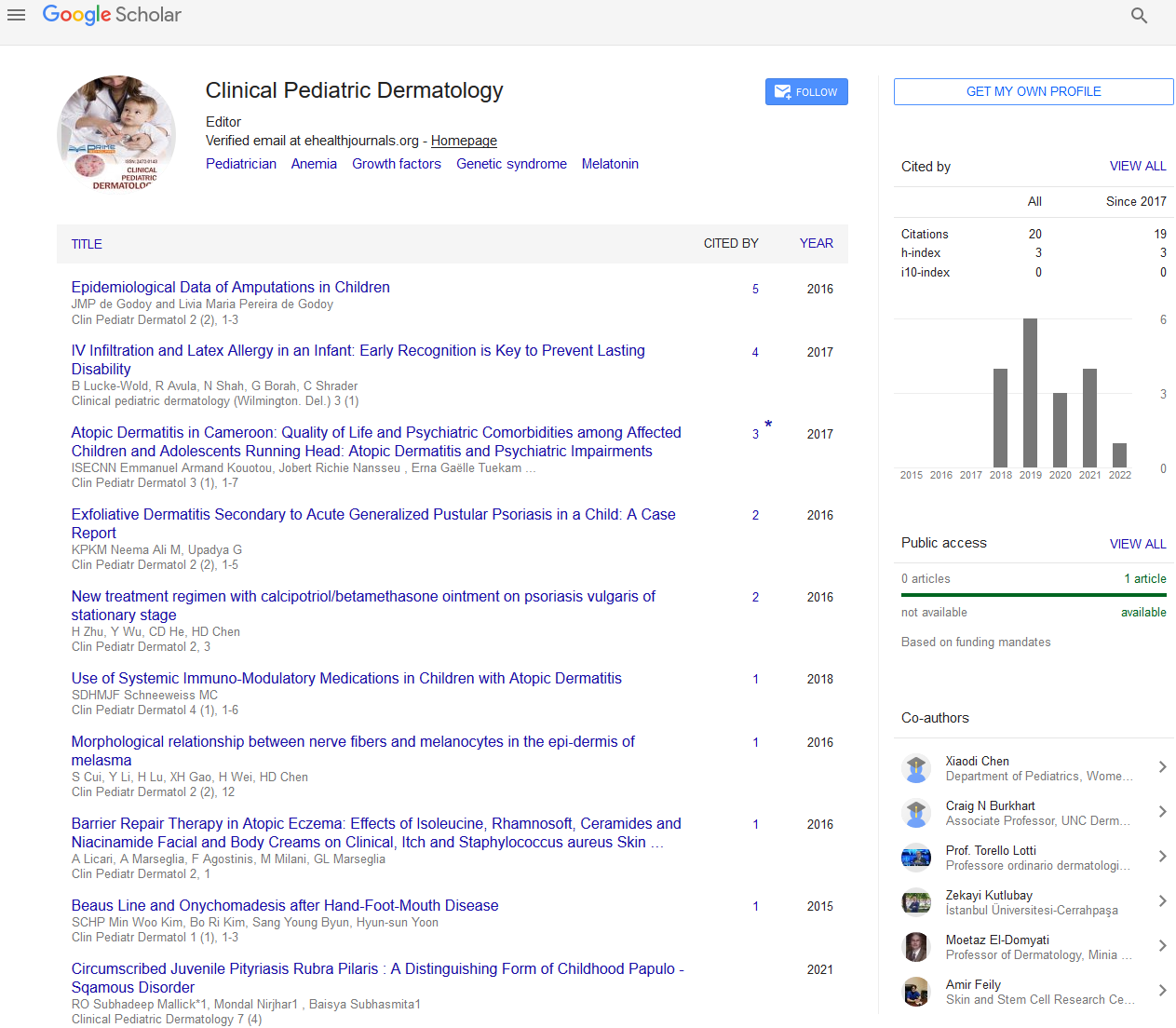Image Article - (2023) Volume 9, Issue 2
Ichthyosis Linearis Circumf exa as the Only Clinical Manifestation of Netherton Syndrome: A Female Preponderance
Harshita Sharma* and
Ashwin Charaniya
Department of Dermatology, Rajiv Gandhi University of Health Sciences, Karnataka, India
*Correspondence:
Harshita Sharma, Department of Dermatology, Rajiv Gandhi University of Health Sciences,
Karnataka,
India,
Email:
Received: 07-Sep-2022, Manuscript No. IPCPDR-22-14238;
Editor assigned: 09-Sep-2022, Pre QC No. IPCPDR-22-14238 (PQ);
Reviewed: 22-Sep-2022, QC No. IPCPDR-22-14238;
Revised: 27-Dec-2022, Manuscript No. IPCPDR-22-14238 (R);
Published:
02-Jan-2023, DOI: 10.21767/2394-3718-9.2.11
Case Description
An 8-month-old female child was brought with the complaint of generalized scaly skin lesions since birth. It started over the scalp and progressed to involve rest of the body. She was born at full-term without collodion membrane. Her two sisters had similar problem since infancy and parents were first-degree cousins. Physical examination revealed serpiginous erythematous plaques, surrounded by double-edged scale characteristic of Ichthyosis Linearis Circumflexa (ILC) (Figures 1 and 2).
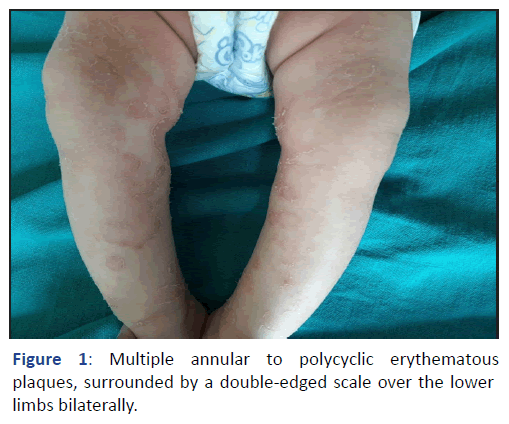
Figure 1: Multiple annular to polycyclic erythematous plaques, surrounded by a double-edged scale over the lower limbs bilaterally.
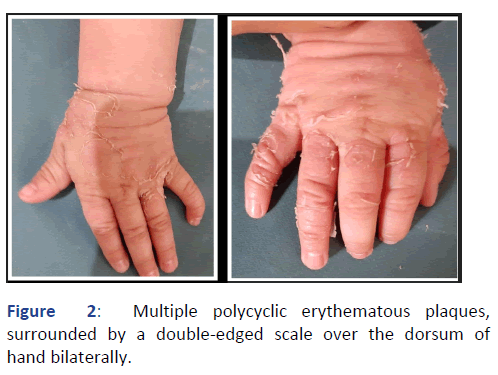
Figure 2: Multiple polycyclic erythematous plaques, surrounded by a double-edged scale over the dorsum of hand bilaterally.
Erythema and desquamation were prominent over the trunk (Figure 3). Scalp had diffused scaling (Figure 4).
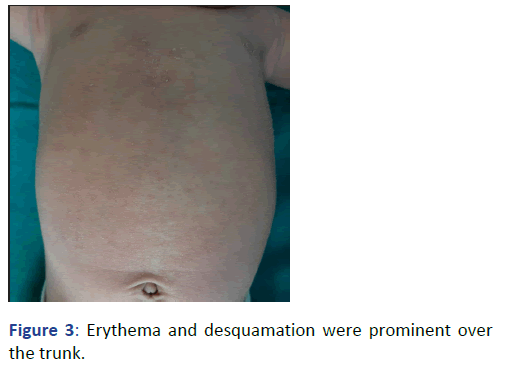
Figure 3: Erythema and desquamation were prominent over the trunk.
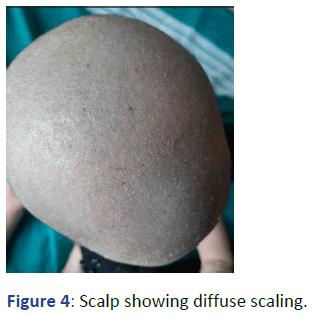
Figure 4: Scalp showing diffuse scaling.
Diagnosis of Netherton Syndrome (NS) according to the strict published diagnostic criteria was made. Patient was managed using moisturizers and antibiotics. NS is rare, autosomal recessive disorder with history of consanguinity in the family with triad of ILC, trichorrhexis invaginata and atopic diathesis [1]. NS begins at birth with multiple clinical manifestations causing delay or lack of diagnosis. The differential diagnosis of atopic dermatitis, autosomal recessive congenital ichthyosis was made. However, proposed diagnostic criteria for NS requires presence of any one of the following beside allergic manifestation: Erythroderma, specific hair shaft defect, history of NS in sibling or identification of spink mutation. Despite unavailability of light microscopy and DNA sequencing analysis, picture of our patient confirms the diagnosis of NS. Beyond neonatal period, skin changes emerge into ILC as polycyclic migratory plaques and peripheral double-edged scaling. Here, we report ILC in female child with history of the same in other two female siblings at birth in absence of any other skin and hair manifestation with positive history of consanguineous marriage of their parents. Guerra L, also documented ILC as the only clinical manifestation of NS which is similar to ours except that, here, we also theorize the greater incidence of ILC in females with other supportive history mentioned below [2]. The authors hypothesizes that any female child with history of generalized scaly skin lesions since birth evolving into double-edged scaling, history of similar complaints in other female’s sibling with or without hair shaft defect and with positive history of consanguineous marriage of the parents should arouse suspicion of ILC. Early recognition would help in curing known complications of ILC such as developmental delay and intermittent aminoaciduria, to name a few.
References
- Guerra L, Fortugno P, Pedicelli C, Mazzanti C, Proto V, et al. (2015) Ichthyosis linearis circumflexa as the only clinical manifestation of Netherton syndrome. Acta Dermato-Venereo. 95(6):720-724. [Crossref] [Google Scholar] [PubMed]
- Barbati F, Giovannini M, Oranges T, Lodi L, Barni S, et al. (2021) Netherton syndrome in children: management and future perspectives. Front Pediatr. 9:645259. [Crossref] [Google Scholar] [PubMed]
Citation: Sharma H, Charaniya A (2023) Ichthyosis Linearis Circumflexa as the Only Clinical Manifestation of Netherton Syndrome-A Female Preponderance. Clin Pediatr Dermatol. 9:11
Copyright: © 2023 Sharma H, et al. This is an open-access article distributed under the terms of the Creative Commons Attribution License, which permits unrestricted use, distribution and reproduction in any medium, provided the original author and source are credited.





